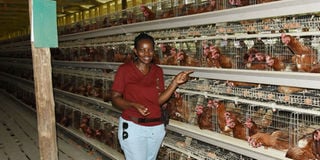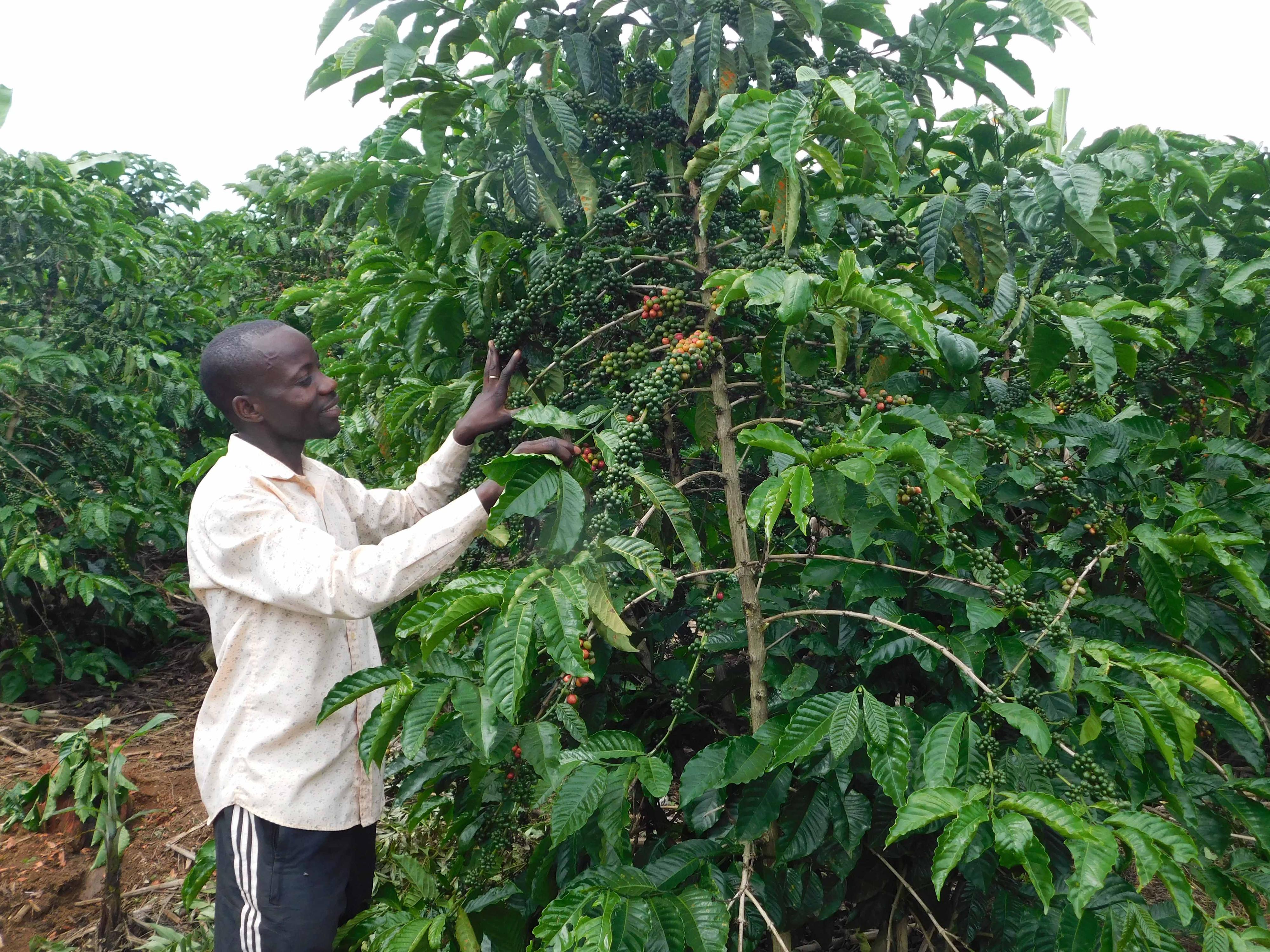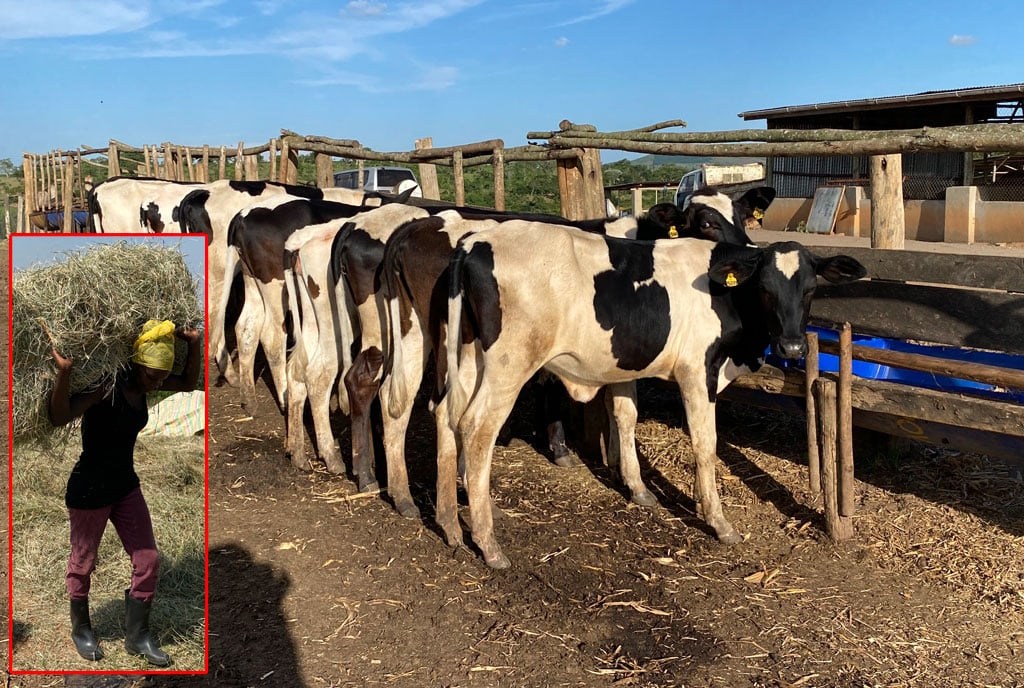
Gabindadde-Musoke explains how the cage system works.
Building a professional career can be quite fulfilling for many, but comes with demanding hours and deadlines that keep many away from the social scene and limit their time as focus and commitment are key values for growth in the corporate realm.
Many professionals never realise that they have not lived enough until they retire and start to pursue their passions.
About a decade ago, Gorret Gabindadde-Musoke pulled the plug on her accounting job to pursue her passion for farming. This career change has allowed her to spend more time with her family. Since then, she has achieved great success in the agricultural industry, blazing the path for other aspiring farmers.
In 2014, she started a mixed farm called Biwooma Farmers Limited, which spans about eight acres and is located in Namaina-Gayaza, outside Kampala. The farm mainly focuses on poultry products.
According to her, the farm includes her home, a piggery area, chicken layers and broilers, pine trees, vegetable gardens, a training facility, a mini-sized abattoir, and a cold room.
Never afraid to learn from industry leaders and global trends, she has been able to evolve into a connoisseur in her rights, propelling herself forward in the poultry farming business.
“I have always sought advice from Aga Ssekalala of Ugachick, my various suppliers, and from the internet. Most of the knowledge I have acquired has come from making mistakes and trying again repeatedly. When we began, we didn’t realise how important the direction of the sun was for placing the coops. Our initial structures were significantly affected by the sun. However, through seeking knowledge and learning, we have been able to solve that problem. Our new structures are now positioned strategically to protect the birds from the sun and ensure proper airflow,” she explains.

Gabindadde-Musoke her broiler birds. PHOTOs/Trevor Lutalo
On her learning journey, Gabindadde-Musoke says it takes time to choose the right supplier for feed, farm supplies, and chicks, but eventually, you stick with your suppliers, and for her, this has resulted in stable and quality production over the years.
“We produce about 350 trays of eggs per week, for broilers we normally start selling at five and a half weeks because we want to sell a bird that is appealing to everyone and safe to eat. So we normally sell our birds at 1.5 or 1.8kg and above so basically we sell in kilogrammes, so when I talk about kilogrammes I am talking about dead weight, not live weight,” she reveals.
She hopes in the future they will be able to scale up business to meet all year round supply and be able to standardise and brand their products that will end up on shelves across the country, this being the direction they strive to meet in the short run.
Using technology
One of the major highlights at Biwooma, they have been able to integrate technology into their operations. The technology involves use of cutting edge Dutch machinery in the broiler coop.
“We have an automated broiler facility that carries 5,000 birds. Everything is automated from the food to the water, it is equipped with a medicator that we use to administer vitamins, boosters, and any treatment to the birds,” she says.
“So with the regulator, actually both the feeders and drinkers have gauges that start from day one, this is adjusted weekly as the birds progress. During the first week, the water nipples are closer to the floor and we limit the pressure depending on how old our birds are,” she adds.

The farmer teaches others about the value chain of poultry farming.
Gabindadde-Musoke says the automated system, is a game changer because only one person is required to watch over 5000 birds and load feed into the silo and monitor intervals for vaccination, the rest is done automatically.
“The birds receive water from automatic nipples therefore there will be no concerns of getting the place wet or dirty. Compared to the traditional farmer, a lot of manpower is required to become effective and efficient, you have to clean and replace feed constantly. Normally for every 1000 birds you need one worker which would translate into five workers. The system ensures a constant and steady supply of feed and water, our job is to monitor that there is food in the silo and clean water in the tank. This is critical for the growth of our birds, they never lack food or water,” she highlights.
The system is equipped with a medicator that administers vaccines, boosters and vitamins in the right quantities preventing waste. The medicator also regulates the quantities that are dispensed to the birds depending on the stages.
Gabindadde-Musoke says it is quite expensive to set up a facility because “it can cost upwards of Shs50m, this amount takes care of the commercial size chicken house and all the amenities minus the equipment which is shipped from the Netherlands which goes for about Shs74m before taxes and shipping costs.”
“But I believe shortly this will be more affordable and available to many other farmers following the example of when the battery cages were introduced in the country they were very expensive but in the long run they became affordable for many farmers,” she explains.
Furthermore, nothing goes to waste as litter from the coops is dried and sold off as fertiliser or used in their own gardens. The biggest portion is carried away through gutters to a biogas pit that serves as fuel for cooking and lighting.

A farm worker operates a temperature regulatory machine.
Lending a hand to other farmers
Sharing knowledge is one of Gabindadde-Musoke’s fine suits, over the last seven years she has passed on skills and knowledge to budding and established farmers in her area and beyond.
“It is important to share what we know and as well learn from others, in this way, we can ensure quality and growth as an industry. We usually have free quarterly workshops to strengthen and offer advice to farmers,” she says.
She further explains that the training covers the basics of how to set up a poultry business to biosecurity and has inspired many farmers to change their way of operation and as well ensure quality produce.
“During peak seasons, we cannot meet all the demand we therefore buy from our farmers that adhere to the quality standards therefore the workshops are key for this to happen,” she stresses.
Biosecurity on the farm
Gabindadde-Musoke says biosecurity is very important for any farm and without putting in place clear measures the system would crumble.
“For the cases of biosecurity. When a visitor comes to our farm, we provide them with boots, an overall or an overcoat, and a disposable hair net. Then you are sprayed with disinfectant, for vehicles, they have to go through a wheel wash,” she explains.
The farm manager, Maria Lunkuse says “Every section is separate from the other with its equipment and staff, nothing crosses from the layers to the broilers. We do that basically because chickens are unique and react differently to diseases or infections. Broilers are prone to cough, if mixed with the layers it would result in a crisis because layers are asymptomatic and by the time you realize it is too late. This system enables us to curb the spread of disease across the farm so that we can churn healthy birds and products,” she says.
Technology
One of the major highlights at Biwooma, they have been able to integrate technology into their operations. The technology involves use of cutting edge Dutch machinery in the broiler coop.




